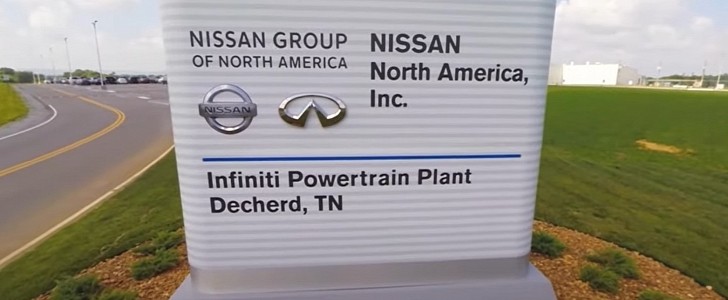It seemed like a good idea at the time, in June of 2014, when the Infiniti Decherd Powertrain plant in Tennessee began producing the 2.0-liter turbo engines for the Infiniti Q50 and Mercedes-Benz C-Class automobiles, but market conditions have changed substantially since its opening.
Firstly, Infiniti stopped producing the engine for the Q50 after the 2019 model year. Secondly, earlier this month, Mercedes-Benz announced dealers that they will no longer use the Tennessee-produced engine in their GLE mid-sized crossover and Sprinter and Metris commercial vehicles.
The facility, a $319 million collaboration between a Nissan and Mercedes, produced the Mercedes-developed engine used to power various models in both Nissan and Mercedes vehicles.
Conceived in the era of ousted Nissan chairman Carlos Ghosn and former Daimler CEO Dieter Zetsche, the plant was designed to build 250,000 engines annually, but only reached 35% capacity at its height in 2020.
Mercedes-Benz spokeswoman Andrea Berg said the engine "product cycle will end in the course of the next year. Production is running out according to plan, and the cooperation with Nissan in Decherd is ending," as reported by Automotive News.
The industrial alliance was announced in 2010 between the two automakers, to share vehicles and powertrain technologies. Another, $1.4 billion, auto assembly joint venture in Mexico known as COMPAS, producing Mercedes and Infiniti vehicles is also on the rocks as both companies drift away from the alliance and revamp their lineups.
Industry analysts do not expect the COMPAS facility to produce vehicles beyond 2026. At its peak, coincidentally also in 2020, the facility that makes the Mercedes GLB crossover and the Infiniti Q50 and Q55 crossovers, produced less than half of its capacity of 230,000.
Sources had pointed to governance issues within the facility, with the Mercedes and Nissan lines operating different production methods resulting in confusion, and impacting quality and efficiency.
Neither Mercedes or Nissan commented on the future of the facility, but with both companies rapidly moving toward electric vehicles, an engine facility and a factory assembling a combustion engine platform may be rendered useless and mapped for a total repurpose of assembly operations.
The facility, a $319 million collaboration between a Nissan and Mercedes, produced the Mercedes-developed engine used to power various models in both Nissan and Mercedes vehicles.
Conceived in the era of ousted Nissan chairman Carlos Ghosn and former Daimler CEO Dieter Zetsche, the plant was designed to build 250,000 engines annually, but only reached 35% capacity at its height in 2020.
Mercedes-Benz spokeswoman Andrea Berg said the engine "product cycle will end in the course of the next year. Production is running out according to plan, and the cooperation with Nissan in Decherd is ending," as reported by Automotive News.
The industrial alliance was announced in 2010 between the two automakers, to share vehicles and powertrain technologies. Another, $1.4 billion, auto assembly joint venture in Mexico known as COMPAS, producing Mercedes and Infiniti vehicles is also on the rocks as both companies drift away from the alliance and revamp their lineups.
Industry analysts do not expect the COMPAS facility to produce vehicles beyond 2026. At its peak, coincidentally also in 2020, the facility that makes the Mercedes GLB crossover and the Infiniti Q50 and Q55 crossovers, produced less than half of its capacity of 230,000.
Sources had pointed to governance issues within the facility, with the Mercedes and Nissan lines operating different production methods resulting in confusion, and impacting quality and efficiency.
Neither Mercedes or Nissan commented on the future of the facility, but with both companies rapidly moving toward electric vehicles, an engine facility and a factory assembling a combustion engine platform may be rendered useless and mapped for a total repurpose of assembly operations.





